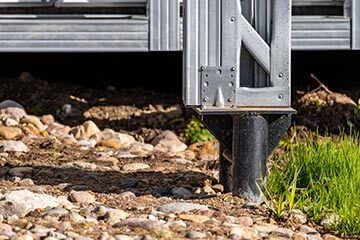Sometimes home insurance can be cancelled or refused, and while it might come as an unwelcome surprise, it's not uncommon.
Having home insurance is pretty important after all. You want to protect your home and belongings, but having a policy in place could also be a compulsory condition of a mortgage.
Here's why an insurer might cancel or refuse a policy, and what steps you can take if it happens.

Why could you be refused home insurance?
There's a number of reasons why you could be refused home insurance or have your policy cancelled or voided.
The main reasons tend to relate to the risk you or your property poses to an insurer. The greater the risk, the likelier this could happen to you.
So, what could pose a risk? Let's take a look:
Subsidence, underpinning and structural issues
Anything that calls into question the stability of your property (like subsidence) could reduce the number of home insurance options available to you.
What you pay for home insurance and your excess amounts are likely to reflect the structural risk of your property. Even if you have limited options available, you could still look for specialist insurance or contact a home insurance broker.
Changing circumstances and claims history
You may not think it, but changing jobs to a riskier profession could impact your home insurance policy. Other things like trying to get home insurance with a criminal conviction could also make it harder to get a quote, or more expensive.
If you don't disclose key information to an insurer, it could invalidate your home insurance policy. Not mentioned any home insurance claims you've made over the past five years? An insurer could find this out and refuse any application on the grounds of failing to disclose information or an extensive claims history.
What would make your home insurance policy void?
Things change all the time and can spring up when you least expect them to.
That's why some of the reasons an insurer might refuse cover are the same reasons a policy can later be made void.
Take this example: let's say you finally want to go ahead and build that dream conservatory you've always put off. It's easy to forget to tell your insurance provider...especially if you've reached peak excitement! But changes like this matter. Building work can alter the value of your home and increase the risk of accidents while the work's being done. If you don't let your insurer know, you could find yourself in a tricky spot if you ever need to claim. So remember to always tell your insurer about DIY or building work in your home.
Here's some common situations that could invalidate house insurance:
- Leaving your property empty: Most home insurance policies generally state that you cannot leave your property empty for an extended period of time (usually 30 days). So, if you plan on leaving a property empty for longer, you should let your insurer know. They might offer unoccupied home insurance cover at an extra cost.
- Not securing your home or property keys: It's a pretty good habit to always lock your doors or windows when you leave home. At the very least it could prevent burglars, but any potential claim could be rejected if there's no signs of forced entry. This could also be the case if you don't take care looking after the keys to your home.
- Not maintaining your property: One of the most common exclusions you'll find in a home insurance policy is general wear and tear. From an old window lock seizing up to a boiler breaking down due to infrequent servicing, insurers generally expect you to keep your property maintained. If you make a claim, and the affected area or item hasn't been looked after, it could be rejected.
- Faulty smoke alarms: It's hard to overstate just how important it is to ensure smoke alarms in your property are working as they should. After all, they save lives! You should regularly test these devices to check they're working, and it's typically recommended you replace detectors after 10 years. If your detector does not work in a fire incident, and you need to claim, it could be rejected.
Do I need to tell my insurer about any building work?
Absolutely. There's 2 main reasons why:
- Building work and renovations could affect the value of your property
- These projects could create a greater risk of accidents and structural damage
Projects such as an extension, building a conservatory or porch, or a loft conversion can increase the value of your home and the cost of rebuilding it. You'll typically be asked what the rebuild value of your home is when getting a buildings insurance policy. So if it increases during your policy, you might not be covered up to the new cost.
In some cases, the cost of your policy might not increase, and you'll still be covered for the duration of the building work. In which case, happy days, just make sure you request details in writing.
But this doesn't always happen. Your home insurance premium could increase as a result, or you might also be required to buy additional renovation cover for any work you've got planned.
But why would you need a separate specialist policy for building work or a renovation?
This is because a standard buildings insurance policy doesn't always cover these projects. If yours doesn't, you might not be fully protected and could need additional specialist renovation insurance. Either way, your insurer should let you know where you stand.
Planning a smaller glow-up in the form of a fresh lick of paint or a few new shelves? Rest easy, minor DIY projects are generally included in a standard home insurance policy. If you're concerned or unsure, have a look back over your policy docs or contact your insurer.
Can I cancel my own home insurance policy?
Yes, you'll generally have the option to cancel your home insurance policy at any time.
Although, ideally, you'll want to do this during your cooling-off period if possible. By law, all home insurance policies must include a 14-day cooling-off period from purchase. If you cancel your policy during this time, you might still have to pay setup and cancellation fees, but not always – as long as you don't claim!
Beyond the cooling-off period, most insurers issue a pro-rata refund if you haven't made a claim for the duration of the policy. So, cancelling halfway through a policy means you'll only be refunded half of the original premium minus any cancellation or administration fees.
If you enjoyed any discounts when you bought your home insurance policy, you should probably expect those to be cancelled. So, those amounts will likely be deducted from your refund.
What are my options if I’ve been refused home insurance?
Hold fire for the moment and maybe stick the kettle on while you think about your next move. After all, if you've been refused a policy, you'll need to declare it on future applications, and rushing into more quotes could make things trickier down the line.
The good news is you do have options. You can appeal a refusal or look into other ways to get covered. Here's what to consider next:
- Contact the insurer that refused to offer a policy and ask for the reasons why. It's also important if you could get the reasoning outlined in writing via email or by letter. You could need a refusal in writing as evidence for later.
- It could be an administrative error, or you could have applied by accidentally submitting a wrong answer. Speak to your insurer to resolve the issue, it could be that explaining your situation may overturn the refusal.
- Submit a written complaint to the insurers' complaints department. Contact information should be signposted on their website, but you can also ask for this over the phone or via email.
- Get in touch with the Financial Ombudsman Service (FOS). Insurers have up to 8 weeks to respond to any complaint before the FOS can proceed with your case. If the insurer in question does not respond in this period, or you're dissatisfied with the response, you can take the matter further.
- Look at alternative options or assess legal advice. You could search for policies from other insurers by comparing quotes. If you still can't find a suitable home insurance policy, a broker or a specialist provider might be able to help. Progressing any legal matter can be an expensive pursuit, so it's worth examining every other option first.
Does cancelled home insurance affect my car insurance?
It depends on who did the cancelling - you or your insurer.
If you decided to pull the plug on your home policy mid-term, you shouldn't have too much trouble finding car insurance. But it's a different story if an insurance provider cancelled your policy or refused to offer cover in the first place.
That's because the Motor Insurers’ Bureau (MIB) runs a central database called the Claims and Underwriting Exchange (CUE).
This database stores information detailing claims and incidents reported by insurance providers. The key bit here is that it stores millions of records for car, home, travel and motorbike claims. CUE is primarily used to prevent fraud, but it can also build an accurate risk profile.
So, let's say your home insurance has been cancelled because you haven't declared key information to an insurer. If you then go and search for car insurance, other providers can access CUE to view any reported incidents.
So, yes, voided or cancelled home insurance can affect car insurance.
Tips to help avoid refused or voided home insurance
Sometimes insurers cancel or refuse cover for reasons that are out of your hands. But there's things you can do to give yourself the best chance of staying covered:
- Honesty is the best policy when filling out an insurance application. If you're stuck on certain details, come back to your application later with everything at hand.
- Keep your insurer in the loop. New house, new car, new job, or even a new member of the family! Major life events that affect your finances are certainly something you should mention to your insurer.
- Try to stay on top of payments. If you're struggling to make a payment, speak to your insurer. You could even change your payment dates in some cases to ease the issue.
- Don't give up looking. Try specialist insurance policies if you're finding cover hard to come by. If you're really stuck, try contacting insurance brokers who specialise in your circumstances.







